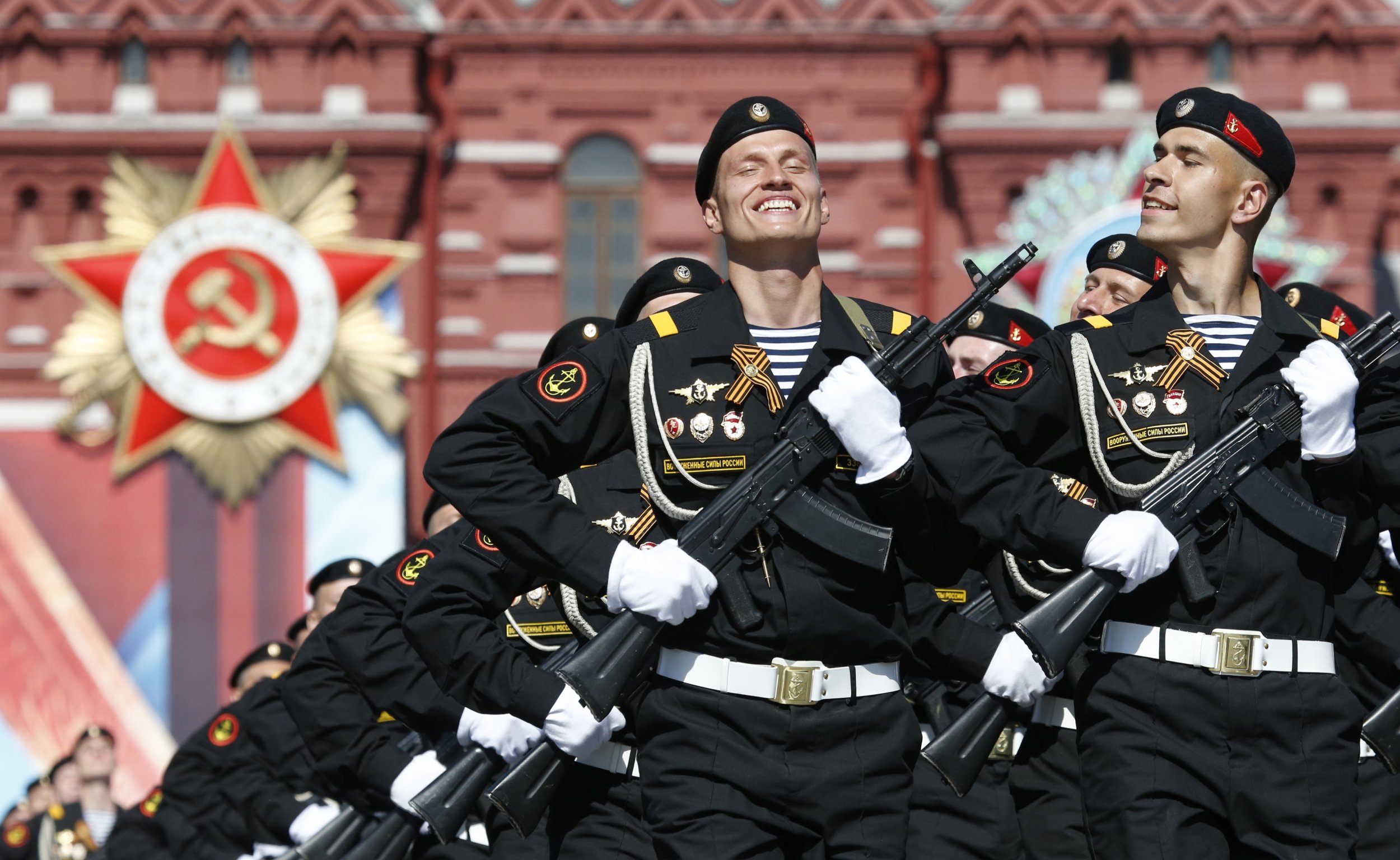
The world will be treated to a display on Monday that, for those in the know, makes for spectacular viewing—Moscow's Victory Day Parade.
The show hasn't changed since Soviet times. Every May 9, to mark the defeat of Nazi Germany, the Red Square fills with the beat of marching troops and the rumble of war machinery. The walls of the Kremlin are bedecked with celebratory banners. If bad weather looms, planes are dispatched to seed the clouds, ensuring that the rains begin and end before they reach the capital.
Russian President Vladimir Putin and his most senior officials, along with dozens of international guests, preside over the ceremony. And the whole thing is broadcast live across the country's 11 time zones. It's Russia's penchant for pageantry at its finest—modern production values married to a military spectacle born of a very different era.
To Western eyes, the whole thing looks almost comically anachronistic. All that goose-stepping, the veterans wearing their impossibly large arrays of medals, the display of naked, almost vulgar military might. Not to mention the World War II-era uniforms, the red flags, the hammers and sickles, and the Soviet military anthems—and all this for a war that is now more than 70 years in the past, fought by a fallen regime. It's like the country is stuck, every spring, perpetually reenacting the moment of the Soviet Union's greatest triumph. Why do they keep doing this?
The analogy of historical reenactment is actually not far off. Every government, save perhaps for the most absolutely despotic, must maintain legitimacy among its people. And in all societies—with varying degrees of coercion—that legitimacy is sustained through storytelling and myth. In Russia's case, the yearly remembrance of the "Great Patriotic War" is how the state retells itself—and the people over which it rules—its most important legitimizing story.
This is not to say that the ritual is a hollow one. The trials of the war were so catastrophic that they touched every family—over 15 percent of Soviet citizens lost their lives in the struggle. It's a level of sacrifice no Western public can imagine, and as such, its value as a legend is incalculable—a war so useful that, if it hadn't happened, Stalin would have had to invent it.
It is no less useful for Putin. "The great victory," he said in 2015, "will always be the heroic height of our country's history." And through its every invocation, he reinforces and extends to modern Russia the legitimacy its predecessor regime won on the field of battle. It's a story so powerful that it not only cemented Communist rule at home, but convinced the free world to tolerate the subjugation of Eastern Europe for half a century.
Needless to say, the repeated glorification of a victory that was particularly Soviet says something about the nature of modern Russia, and how it differs from the West. It's striking how little the observance of Victory Day has changed since the Soviet era—the same words, the same images, the same music. And so, by necessity, the values the day appeals to have changed little: collective sacrifice, strong central leadership, heroic resistance to implacably hostile outsiders. Not coincidentally, these are the very same themes Putin is pushing today, with increasing vigor, as Russia's economy continues its slow degradation.
It is no accident, then, that the May 9 celebration is accompanied, across the country, by a flowering of the cult of Stalin. Sure, mistakes were made, and excesses were permitted, many Russians will allow. But the unabashedly despotic leader saved the country—and liberated an ungrateful Europe—from the fascist hordes.
It's not a narrative that encourages soul-searching or critical thinking. For all the reminiscing, there is little appetite in Russia today to discuss the darker sides of its World War II history. For example, the fact that Stalin was initially allied with Hitler and only too happy to divide a prostrate Poland between them. (Last week, the leader of the Night Wolves, a Putinist biker gang, shoved a reporter in outrage when he dared to bring up this uncomfortable episode.) Or how about the fact that, for all the credit he gets, Stalin had purged the Red Army's most talented leaders, failed to anticipate Hitler's treachery, and only saved the country from his mistake by throwing countless citizens into the meat-grinder? How about the Red Army's treatment of the local population—from slaughter to looting to wanton rape—as it "liberated" Europe? The contrast to how Germany itself has processed its own dark past could not be starker.
As the splendidly outfitted soldiers march through Red Square this year, they will pass another Soviet relic—the tomb of Lenin, who, more than 90 years after his death, still lies in state, an army of technicians monitoring his slow decay. Most Russians acknowledge that the time for communism has passed, and there may soon come a time when his body, and his legacy, will finally be buried. But so long as the tanks keep rumbling past every May 9, a part of the Soviet Union will still be with us.
Ilya Lozovsky is assistant editor for Foreign Policy's Democracy Lab. Follow him on Twitter at @ichbinilya.
Uncommon Knowledge
Newsweek is committed to challenging conventional wisdom and finding connections in the search for common ground.
Newsweek is committed to challenging conventional wisdom and finding connections in the search for common ground.
About the writer
To read how Newsweek uses AI as a newsroom tool, Click here.








